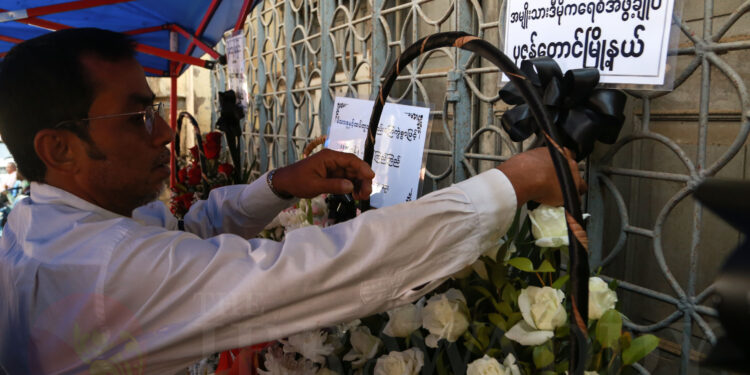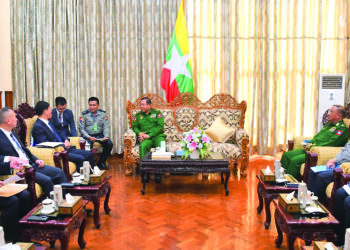Three years ago today, U Ko Ni, a prominent National League for Democracy lawyer and aide to Daw Aung San Suu Kyi, was gunned down in broad daylight at Yangon International Airport as he returned from an overseas trip. Many people quickly came to believe that U Ko Ni was targeted because of his staunch support for efforts to amend Myanmar’s undemocratic, military-drafted 2008 Constitution. Three years on, four people have been convicted in connection with the killing, including the gunman, but the alleged mastermind, former Lieutenant-Colonel Aung Win Khaing, remains at large. To mark the third anniversary of the assassination, The Irrawaddy revisits an editorial published in the wake of U Ko Ni’s death, recalling his legacy.
One of Burma’s most prominent lawyers was gunned down at Yangon International Airport on Sunday as he returned from an overseas trip.
The assassin knew that U Ko Ni was returning from an official visit to Indonesia where he had held meetings with Buddhist and Muslim religious figures who were involved in addressing tensions in Arakan State. The group aimed to draw on lessons from Indonesia’s past that could be applied to the current ethnic and religious tension in Burma.
As U Ko Ni waited on the sidewalk for a car to pick him up, the assassin approached from behind and shot him. The assassin tried to run away but was subsequently caught by a group of brave taxi drivers.
Police have named the suspect as Kyi Lin and said that he is from Kyaukme in Shan State and previously served seven years in prison. He is now in police custody.
The assassin’s precise motives remain unknown, and it is unclear if the gunman had any external support, or whether he simply worked alone. But it is clear that this assassination of Daw Aung San Suu Kyi’s legal advisor was deliberate and politically motivated.
Now the country will require a transparent and credible investigation.
U Ko Ni was a prominent Muslim lawyer and close to Daw Aung San Suu Kyi.
Moreover, he was a constitutional expert and strong advocate to amend or replace the 2008 Constitution. That document, which was drafted under the former military government of Burma, grants the army at least 25 percent of all seats in Parliament and control over key ministries.
U Ko Ni consistently spoke out to change the Constitution. He is also believed to have played a key role in advising the NLD party to create the position of State Counselor for Daw Aung San Suu Kyi after the NLD’s landslide victory in the 2015 election.
He was regarded as a rational voice on many sensitive issues including the turmoil in northern Arakan State. He was also behind a push to amend the Race and Religion Protection laws, and it is believed that he received death threats.
U Ko Ni’s visit to Indonesia was believed to have been a successful one.
The trip was aimed at sharing the experiences of overcoming inter-religious tensions. In fact, since the NLD came into power in 2016, U Ko Ni played a key role in addressing the growing issue of hate speech and religious discrimination. He recently described the possibility that there could be a new law introduced to curtail hate speech.
Until his untimely death, U Ko Ni was a fearless fighter who spoke up for his views, and he was a strong force in the democratic movement.
Indeed, he was one of the most high profile Muslim voices in the country, and many admired him.
U Ko Ni will be remembered as a friend of many activists and democrats—he was a friend of many rational voices who believed in diversity and equality. But some might have found his views uncomfortable, and perhaps they felt that silencing him was their only option.
Prominent officials reacted online to Sunday’s dramatic killing. The UN Special Rapporteur for human rights in Burma, Yanghee Lee, spoke out on Twitter to condemn the assassination.
“Not only those responsible for [the] death of U Ko Ni [will be] brought to justice but all those killing, torturing, raping innocent people in #Myanmar!” she wrote.
Former US ambassador to Burma Derek Mitchell shared his condolences on Facebook and said that U Ko Ni “was a good friend and a great man.”
Derek Mitchell urged “U Ko Ni’s cause be our own, everywhere,” and said “may this awful tragedy inspire rather than incite so his death ultimately will not have been in vain.”
Friends of democracy across the world learned of U Ko Ni’s death with great sadness, but remain determined. They salute his work and will remember him as a hero.

















